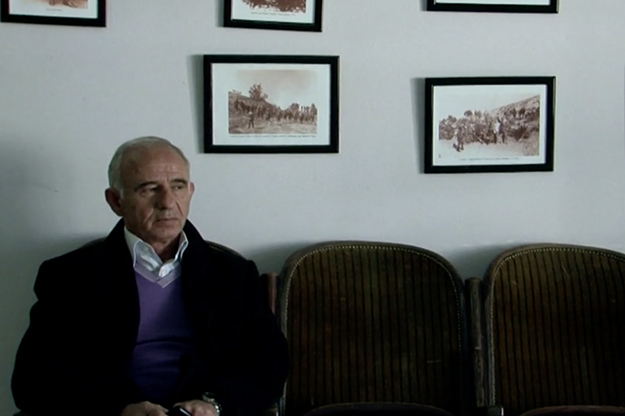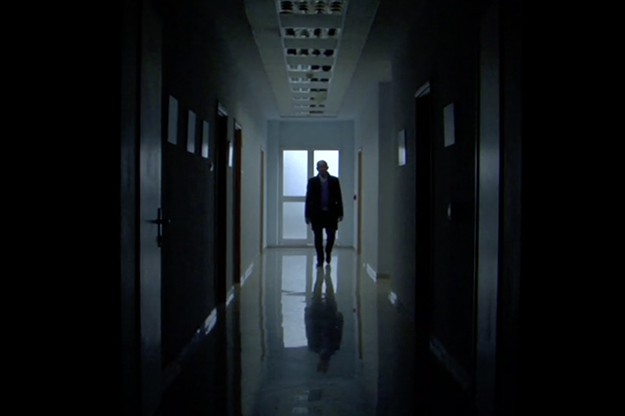From the the competing films in this year’s edition of DokuFest, many would have been particularly intrigued by a short film from Albania titled “Verbally Correct” (“Verbalisht korrekt”). Directed by Leutrim Voka from Macedonia, the film revolves around a shocking event in the period of Albania’s dictatorial regime.
The official synopsis of the film, which was presented for the first time in Prizren this summer, reads as follows: “46 years later, Muharrem Protoduari, the boy sentenced to 20 years of imprisonment for simply listening to foreign music, tells the story of how he became part of a trial arranged by the investigators of the communist regime in Albania.”
Voka’s endeavour is bold. Dealing with the past, attempting to clear off the dust, waking the beast from its sleep and making it sit cross-legged among the people who still have fresh memories of the terror of dictatorship; to analyze, understand or even simply describe the 45 year long hysteria of Albanian society — it takes courage.
It is a difficult undertaking, which risks degrading into an exotic drama that does not transmit anything but romanticism. But sometimes cinema manages to provoke the public conscience, to change or enforce a conviction with cold justification, to prompt the right questions and provoke critical reflection.
What is the truth that Voka tries to make known to us in these 10 minutes? Hoxha’s arranged trials? The fact that people could be persecuted for listening to foreign music? The paranoia of the totalitarian system? The personal history of Muharrem and his family? Muharrem’s relation to his past?
The answer is unclear, but one fact does emerge: Muharrem was not sentenced because he liked foreign music.
There were multiple cases in Albania during that period in which people were sentenced and imprisoned under this justification. However, the trial that took the lives of two youngsters and destroyed those of two others, was held simply because the blood-hungry power structures of the time needed to set an example for the rest of the population.

Photo: Still from “Verbally Correct.”
The dictatorship did this by exploiting certain people and placing them in the middle of conspirative scenarios, such as the one where these boys were declared to have had the power and the will to topple or damage the regime. They invented conspiracies that sounded true, ranging from establishing a dissident organization, to planning to plant a bomb, to escaping the country.
All of this was to pressure and scare the people. A simple accusation of listening to foreign music would not have had the same effect. And who better than a group of unprotected people, a group of kulaks above all, whom the repressive state apparatus had coaxed and violated in the past, to be used as the perfect sacrifice?
In 2014 and 2015, a pair of television shows were broadcast that declared that the facts of the Protoduari case were these: Muharrem Protoduari was one of the four youngsters from the village of Poshnje near Berat who were sentenced in a phony trial in January 1978, for a crime he did not commit, or even think of. The three others were his brother and two of his friends.
The group was left without an escape after light was shed on a criminal plan to blow up the Mao Zedong Textile Combine in Berat, with its surface of 40 hectares of land. Foreign music was simply one of the details of this arranged trial, integrated in the process simply to enforce the criminal profile of the defendants. In our case, also of Muharrem himself.
Under torture and pressure from the investigators, the boys chose to accept every accusation made by the State Security, hoping that their sacrifice would give an end to the persecution of their family members. Sako Protoduari and Riza Ahmeti Azizi were executed by firing squad, as ordered by the court.
Muharrem Protoduari and Muço Çobo were each sentenced to 20-25 years of imprisonment, disenfranchised for 5 years and had their assets confiscated. Their punishment was under the declaration that they had formed an anti-revolutionary organization that planned to betray their motherland by escaping, as well as creating a diversion, recruiting other people with the objective to expand and empower the organization, and developing agitation and propaganda against the power of the people.
This whole judicial process, conducted in the Textile Cinema-Theatre in Berat, was recorded and edited into a 27 minute documentary by Kinostudio Shqipëria e Re (New Cinema Studio of Albania) in 1971. Titled “The Trial against the declassed from Poshnje,” its aim was to propagate terror throughout the country. For reasons yet unclear, this documentary was never screened, but with the fall of the dictatorial system, it was brought to light by the Central State Archive of Film, and today it is easily accessible by the public.
Staring down the insanity of the past
When Muharrem Protoduari, the only survivor of the four 20 year olds who were persecuted and sentenced, won his freedom, he set off on a mission to shed light on the story which led to this phony trial and the tragedy that followed.
Over the years he has provided hair-raising accounts of the crimes committed by the Socialist state apparatus in Albania, particularly this trial, the details of which have become known to the Albanian public through the second of the Opinion talk shows broadcast in 2015. In it, the Kinostudio documentary was screened in full.
Therefore, Leutrim Voka’s 10 minute recital is no novelty, and it transmits selective information, creating confusion and distorting the truth. Maybe his objective is not Muharrem Protoduari’s history, but a detail from the facts of this history that stands out — perhaps to be used in an artistic manner. I cannot say whether or not such a thing is valuable. Maybe it is, when it serves an artistic cinematographic piece.
But what kind of film is “Verbally Correct”? Is it an art film or a documentary? And as a documentary, is the creation within the genre not supposed to focus on transmitting correct information so as to have an educational approach towards its public?
Voka’s short documentary provides fragmented information. The film leaves the impression that Voka is intervening by imposing his own version of this story, rather than being its narrator. For someone who is informed about this trial and Protoduari’s history, the repetition of the judge’s question about the foreign music, like a soundtrack throughout the film, only enforces this conviction.
In fact, this work is Voka’s story, not Muharrem’s. Voka is presented as a director who, by choosing exotic and badly-told stories or subjects, sets off on a cinematic journey at best. He is dependent on the salvation that his chosen story can provide for him as a director, not on his attempts to salvage, preserve and transmit the story. (Is Voka’s film making us curious or Albania’s terror regime?)
This is sad news for regional cinematography and the history of the dictatorship in Albania, which is passed on to the new generations as an exoticism which conjures mercy and pity by portraying victims of the system as ‘some people who — unfortunately — were imprisoned or killed.’
Dictatorships do not sprout from nothing. They were built by humans against other humans. Such politics deserves to be understood and dealt with correctly, for the sake of human dignity and freedom.
That is why people create — write books and scripts; produce films and documentaries — to let us understand, to remind us of cold facts and fundamental truths about the relations that we establish with humanity, freedom and dignity. They teach us how to go back to ourselves when it seems that we have forgotten how to do so; so that stories like Muharrem’s become another solid rock in our collective memory, for a future in which we learn from past mistakes, so that we do not repeat them ever again.
How does Voka’s film contribute to this? It tries to shock us with pity, but is pity sufficient in this case? Should we simply settle for having mercy and shedding tears, without questioning the insanity of an inhumane system; without questioning ourselves and the moral choices that we would make in similar and unimaginable circumstances?

Photo: Still from “Verbally Correct.”
I feel it is necessary to bring to attention two sporadic cases of artistic pieces, which through their intellectual seriousness and intertwined professionalism of retaining a moral stance against totalitarianism and its crimes, are examples of success and worthy contributions for any artist that has the desire, willingness and curiosity to further explore the challenging relationship with the past.
“Son of Saul,” a cinematographic drama about the Holocaust and the literary testimonies of Primo Levi (a survivor of the Holocaust) are confessions which at their center hold the terror and insanity of Nazism. Their mastery and uniqueness, though expressed in two different artistic fields, lie in the cold-bloodedness and attention to transmitting one of the biggest humanitarian tragedies in history — especially in Levi’s autobiographical case.
As a survivor of the notorious Auschwitz concentration camp, Levi recounts that tragedy in the first person with shocking acuteness and objectivity, driven by a humane mission to show the true face of Nazi camps. Literature as a medium of communication is used by him as a sharp dagger, the blade of which strikes directly to the venom of the past, to bring it forward responsibly to the young reader who will get to know dictatorship and Nazism only virtually through Levi’s words.
Going back to cinema, Lászlò Nemes does the same in “Son of Saul.” He emotionally provokes the viewers but is careful enough not to let them fall prey to their feelings, by nagging at their logic; by facing the audience with that system and the questions that arise as a result of that confrontation. The gravity of his character becomes ours. We become one with it, going out of the shell of the spectator; we are included in Saul’s moral dilemma, in his fear, anxiety and choices (shooting in 35mm and 45mm lenses only enforces this fact).
Mishandling history
In Voka’s film, the wall between the public and the characters is high and insurmountable. The audience is “manipulated” to deal with Muharrem’s tragedy as if that was his misfortune, not a ghoulish consequence of some common public decisions and behaviors which not only conceived the dictatorship in Albania, but legitimated and kept it alive all the way to its end.
Voka’s uncertainty is exposed when he makes a dramatic attempt to embrace Muharrem’s full story, though without distancing himself from his reading of the story: that of a young man being sentenced for listening to foreign music.
“Mr. Protoduari, I want to clarify the moment when the judge asked you about the music,” says Voka to Muharrem and immediately plays the following sequence from the archive documentary: “There, you see? When the judge asks you about the music, you cannot look at him in the eye, and this is a sign of denial.”
What does a “sign of denial” mean? Does it mean that Muharrem’s gestures imply that he is denying the judge’s words or the answer that he gives? Voka’s absolutism and tone is confusing. It almost makes us expect an explanation of some sort about the general relation between human body language and the words that come out of Muharrem’s mouth. However, the explanation that follows is weak, if not banal.
Voka’s language is truncated, reduced to a few basic words that say just about nothing. Perhaps he seeks to communicate to us that the key to understanding this court is to observe the accused; that perhaps this observation expresses what our ear cannot understand.
How does he do this? Through a warm vocabulary; a thoroughly dramatic and unnatural approach — his gaze, which he attempts to keep serious, conjures discomfort, and as a result this exaggeration makes it look ridiculous, if not pathetic.
There is no genuine relation between him and the defendant. Muharrem looks as if he went from the defendants’ bench of the dictatorial regime to Voka’s bench, only to have his tragic history completely depreciated, and to be pushed to give answers that Voka wants to hear, about an almost irrelevant detail along the way.
Immediately after, when the conversation moves on to Muharrem’s brother (Voka asks whether the person sitting next to him in the bench is his brother), a long silence follows. Silence and nothing else. More drama!
Perhaps the most interesting element of the film was the return of Muharrem to the Textile Cinema-Theatre at the Kombinat in Berat, which has now been transformed into a place of entertainment in which coffee and alcohol is served, and where people play billiards. I judged this now playful space to be symbolic, as 40 years ago, the dictatorial regime in Albania, in this very room played as well: the most perverted game with the lives of people.
It is touching to hear Muharrem’s shaky voice recounting the dark memories, but the director did not know how to protect this feeling and elevate it artistically so that we as the audience, do not get comfortable, but strive to explore further; to rebel against the evilness of the dictatorial circuses; to learn why they happened and how it was allowed.
Furthermore, the film’s photography does not continuously follow the same colors in a regular manner: the grey but inviting colors which are seen at the beginning of the documentary give way to a crude image later on. Moreover, it seems that the filming is very amateur almost all the time, but especially in the scene in which Muharrem returns to the place where the remains of his brother were found, or in the end, at the graveyard.
The film is not accompanied by music, but by silence. This is another aspect I found to be interesting. If in other films music is integrated for a more dramatic effect, this type of drama would have been excessive in this film. The sound of silence is stronger and hits harder.
There is something quite enthusiastic and respectable in choosing such subjects, namely how the dictatorship was experienced by a narrow spectrum, or here by an individual, or small group. Perhaps it is particularly this that intrigues us about these kind of pieces. In our case, not a short documentary film, but the dictatorship in Albania which we still haven’t dealt with enough, and in the respectable manner that human dignity and life itself deserve.
Otherwise, this film resembles a trap in which not only the audience (who isn’t able to form a correct relationship to the past) falls into, but also the author, he who damages this relation, the story itself and its characters, fictional and non-fictional.
Feature image: Still from “Verbally Correct.”



